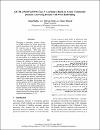Browsing Computer Science & Engineering by Publisher "Association for Computational Linguistics (ACL)"
Now showing items 1-16 of 16
-
A Characterization Study of Arabic Twitter Data with a Benchmarking for State-of-the-Art Opinion Mining Models
( Association for Computational Linguistics (ACL) , 2017 , Conference)Opinion mining in Arabic is a challenging task given the rich morphology of the language. The task becomes more challenging when it is applied to Twitter data, which contains additional sources of noise, such as the use ... -
A light lexicon-based mobile application for sentiment mining of arabic tweets
( Association for Computational Linguistics (ACL) , 2015 , Conference)Most advanced mobile applications require server-based and communication. This often causes additional energy consumption on the already energy-limited mobile devices. In this work, we provide to address these limitations ... -
AraFacts: The First Large Arabic Dataset of Naturally-Occurring Professionally-Verified Claims
( Association for Computational Linguistics (ACL) , 2021 , Conference)We introduce AraFacts, the first large Arabic dataset of naturally-occurring claims collected from 5 Arabic fact-checking websites, e.g., Fatabyyano and Misbar, covering claims since 2016. Our dataset consists of 6,222 ... -
ArCOV-19: The First Arabic COVID-19 Twitter Dataset with Propagation Networks
( Association for Computational Linguistics (ACL) , 2021 , Conference)In this paper, we present ArCOV-19, an Arabic COVID-19 Twitter dataset that spans one year, covering the period from 27th of January 2020 till 31st of January 2021. ArCOV-19 is the first publicly-available Arabic Twitter ... -
ArCOV19-Rumors: Arabic COVID-19 Twitter Dataset for Misinformation Detection
( Association for Computational Linguistics (ACL) , 2021 , Conference)In this paper we introduce ArCOV19-Rumors, an Arabic COVID-19 Twitter dataset for misinformation detection composed of tweets containing claims from 27th January till the end of April 2020. We collected 138 verified claims, ... -
Are We Ready for this Disaster? Towards Location Mention Recognition from Crisis Tweets
( Association for Computational Linguistics (ACL) , 2020 , Conference)The widespread usage of Twitter during emergencies has provided a new opportunity and timely resource to crisis responders for various disaster management tasks. Geolocation information of pertinent tweets is crucial for ... -
CAT: Credibility Analysis of Arabic Content on Twitter
( Association for Computational Linguistics (ACL) , 2017 , Conference)Data generated on Twitter has become a rich source for various data mining tasks. Those data analysis tasks that are dependent on the tweet semantics, such as sentiment analysis, emotion mining, and rumor detection among ... -
Deep learning models for sentiment analysis in arabic
( Association for Computational Linguistics (ACL) , 2015 , Conference)In this paper, deep learning framework is proposed for text sentiment classification in Arabic. Four different architectures are explored. Three are based on Deep Belief Networks and Deep Auto Encoders, where the input ... -
Hulmona ( حلمنا ): The universal language model in arabic
( Association for Computational Linguistics (ACL) , 2019 , Conference)Arabic is a complex language with limited resources which makes it challenging to produce accurate text classification tasks such as sentiment analysis. The utilization of transfer learning (TL) has recently shown promising ... -
IDRISI-D: Arabic and English Datasets and Benchmarks for Location Mention Disambiguation over Disaster Microblogs
( Association for Computational Linguistics (ACL) , 2023 , Conference)Extracting and disambiguating geolocation information from social media data enables effective disaster management, as it helps response authorities; for example, locating incidents for planning rescue activities and ... -
IDRISI-RA: The First Arabic Location Mention Recognition Dataset of Disaster Tweets
( Association for Computational Linguistics (ACL) , 2023 , Conference)Extracting geolocation information from social media data enables effective disaster management, as it helps response authorities; for example, in locating incidents for planning rescue activities, and affected people for ... -
Methodical evaluation of Arabic word embeddings
( Association for Computational Linguistics (ACL) , 2017 , Conference)Many unsupervised learning techniques have been proposed to obtain meaningful representations of words from text. In this study, we evaluate these various techniques when used to generate Arabic word embeddings. We first ... -
QU-BIGIR at SemEval 2017 Task 3: Using Similarity Features for Arabic Community Question Answering Forums
( Association for Computational Linguistics (ACL) , 2017 , Conference)In this paper, we describe our QU-BIGIR system for the Arabic subtask D of the SemEval 2017 Task 3. Our approach builds on our participation in the past version of the same subtask. This year, our system uses different ... -
QU-IR at SemEval 2016 Task 3: Learning to rank on Arabic community question answering forums with word embedding
( Association for Computational Linguistics (ACL) , 2016 , Conference)Resorting to community question answering (CQA) websites for finding answers has gained momentum in the past decade with the explosive rate at which social media has been proliferating. With many questions left unanswered ... -
Qur'an QA 2023 Shared Task: Overview of Passage Retrieval and Reading Comprehension Tasks over the Holy Qur'an
( Association for Computational Linguistics (ACL) , 2023 , Conference)Motivated by the need for intelligent question answering (QA) systems on the Holy Qur'an and the success of the first Qur'an Question Answering shared task (Qur'an QA 2022 at OSACT 2022), we have organized the second version ... -
Simple but not naive: Fine-grained arabic dialect identification using only n-grams
( Association for Computational Linguistics (ACL) , 2019 , Conference)This paper presents the participation of Qatar University team in MADAR shared task, which addresses the problem of sentence-level fine-grained Arabic Dialect Identification over 25 different Arabic dialects in addition ...










